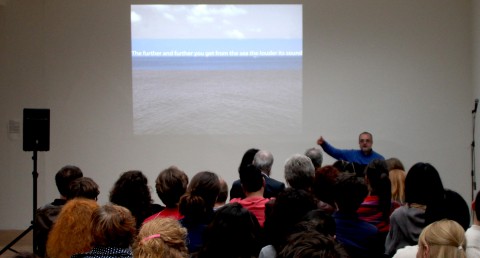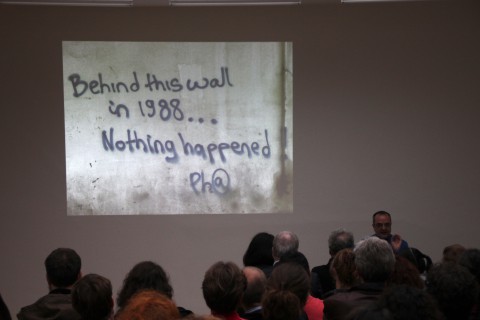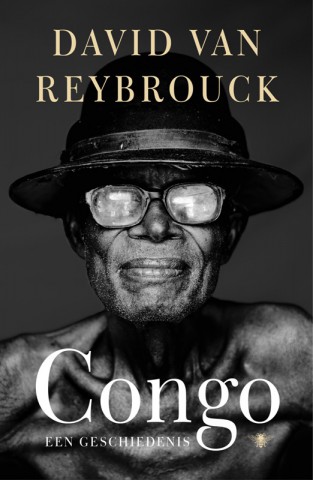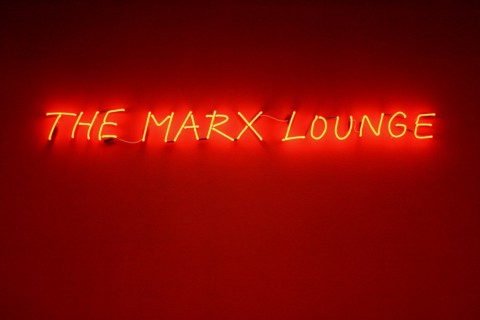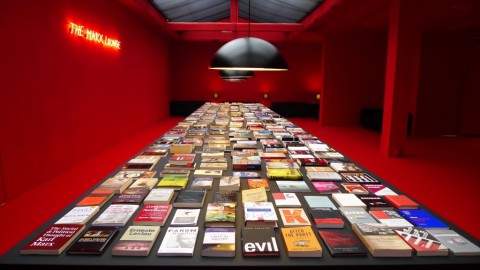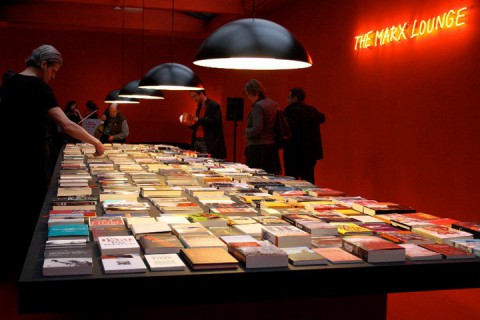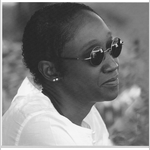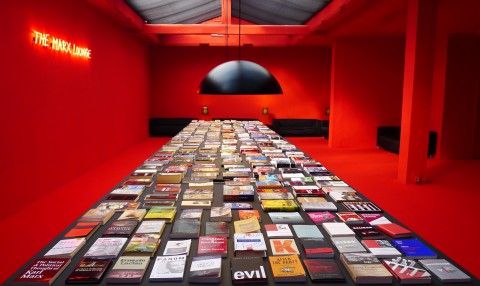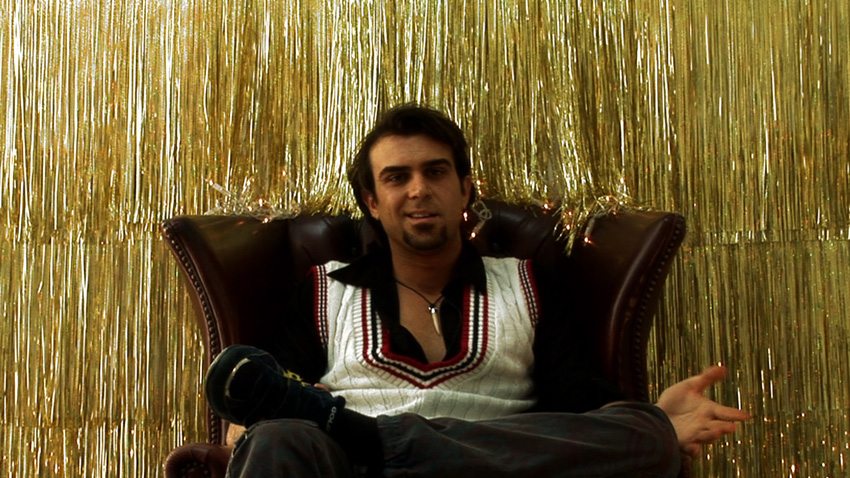On June 25th, architect, writer and artist Tony Chakar (Beirut, 1968) gave a lecture about the influence of the war on the everyday life in Lebanon. The complex history of the country, between 1975 and 1990 there was a civil war in Lebanon, and since 2006 there were several conflicts with Israel, deeply influenced the public space and the manner of dealing with language and culture.
Overview of the exhibition ‘Mounira Al Solh & Bassam Ramlawi’.
With work by Mounira Al Solh, Bassam Ramlawi and René Daniels.
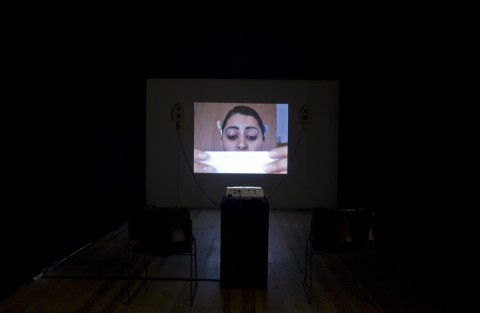
Mounira Al Solh, Double Burger and Two Metamorphoses: a proposal for a Dutch Cat, a Dutch Dog, a Dutch Goat, and finally a Dutch Camel, 2011.
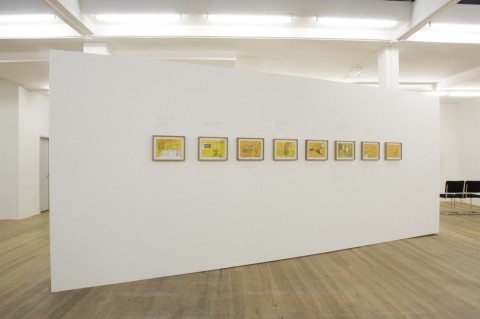
Bassam Ramlawi, From Waiting Blue to Lingering Yellow (or vice versa), 2010.
Elizabeth Suzanne Kassab is the author of the fourth Project 1975 essay
‘The Arab quest for empowerment. A thought of one’s own, a government of one’s own, an art of one’s own.’ Her essay reflects on the role of the intellectual in the Arab world in the decades after decolonization in the context of the ‘Arab Spring’.
While the Arabic regimes were criticised by a marginal group of intellectuals in the seventies, Kassab for instance refers to the Syrian film director Omar Amiralay, they are currenly joined by large masses of ordinary men and women. They reformulate the grievances and claims that were formulated before by the critical thinkers. However, these current demonstrants are not motivated by the writings of these thinkers but instead by the suffering in their own lives and the overwhelmed exasperation. With this shift in the performance and expression of criticism how should we define the role of intellectuals and artists? Download Newsletter 122 here to read Elizabeth Kassab’s essay.
Kassab studied at American University of Beirut business administration and philosophy, and continued her graduate studies in philosophy at Fribourg University in Switzerland. Her overall interest has been in the philosophy of culture, both Western and non-Western, with a particular focus on post-colonial debates on cultural malaise, authenticity and critique. Her book Modern Arab Thought. Cultural Critique in Comparative Perspective was published in 2009 by Columbia University Press. She is currently a visiting research fellow at the Berlin Graduate School for Muslim Cultures and Societies and working on a new book on revolutions and Enlightenment in the Arab world.
Stedelijk Museum Bureau Amsterdam proudly presents the first large-scale solo exhibition by Mounira Al Solh in The Netherlands. Al Solh’s work can be described as an inner conflict with social environments which impose national, cultural and religious identity. In that sense it is a reflection on the social and religious tensions in the country of her birth, Lebanon, which has undergone several civil wars and still occupies a sensitive position in the present eruptions in the Middle East. But here in The Netherlands one’s origins and culture are becoming an increasingly important aspect in social intercourse too. Al Solh approaches this fact with a mixture of autobiographical elements and humour – because how else can one approach censorship, repression, schizophrenia and the discordant culture in which everyone has a role?
A considerable part of the exhibition is devoted to the work of the figure Bassam Ramlawi. Ramlawi is a juice seller in Beirut who has studied art in The Netherlands, and since done portraits of people from around his shop in Beirut. A documentary shows that he is familiar with the oeuvre of Cindy Sherman and with a famous portraitist of the inter-war period, the German artist Otto Dix, but above all he admires the work of the Dutch artist René Daniëls.
Click here for more information about ‘Mounira Al Solh & Bassam Ramlawi’.
Stedelijk Museum Bureau Amsterdam organised a screening of ‘The Forgotten Space’ on May 24th. The evening was introduced by art historian Sven Lütticken, who interviewed director Noël Burch, and the launch of Open #21, cahier on Art and the Public Domain.
In the cinematic essay ‘The Forgotten Space’ (2010) the photographer-filmmaker-writer Allan Sekula travels with the French-American director and film historian Noël Burch. Together they explore the sea, the “forgotten space of our modern age, where globalization becomes visible in the most pressing way”.
In connection with The Marx Lounge, SMBA has organised an intensive public programme of reading circles, lectures, film screenings and artists’ presentations. Here you can read Andreas Zangger’s report of the Postcolonialism Reading Group of May 2nd. To read Jelle Bouwhuis’ report in Dutch click here.
Two artists on Congo
By Andreas Zangger
How do you present suffering in art? Laokoon (wikipedia)
How do Westerners see Congo, if they even look at all? What picture of Congo is presented to them? And what can art contribute to this picture? On Monday May 2nd SMBA hosted the reading group on postcolonialism organized by artist Joris Lindhout to discuss the book Congo – Een geschiedenis (Congo – A history, 2010) by David van Reybrouck and the film Episode III – Enjoy poverty (2008) by Renzo Martens, who was invited as an artist expert.
Journalist Wim Bossema wrote a report about the art scene in Ghana for the Dutch newspaper De Volkskrant. Bossema met the internationally known and successful artist Kofi Setordji, and spoke to him about his new project in which he combines applied arts (and design) with fine arts. For this project, Setordji collaborated with the Nubuke Foundation. Furthermore Bossema discusses the paintings and installations of the Nigerian artist Akirash and the tradition of the highlife music genre in the 1960s and 1970s, which loses popularity due to the current curfew-order.
Click here to read Wim Bossema’s Dutch article ‘In Ghana ligt kunst op straat’.
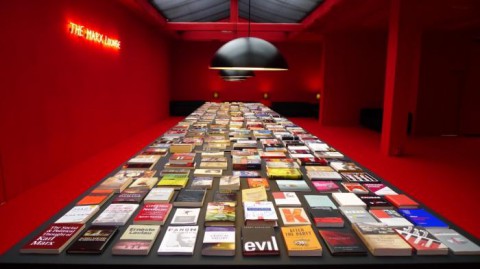
Alfredo Jaar – ‘The Marx Lounge’
Click here to read Andrea Alessi’s interview with Alfredo Jaar, as published on ArtSlant.
The Nubuke Foundation’s Kofi Setordji and Odile Tevie visited the Stedelijk Museum Bureau Amsterdam, thanks to the support of the Prins Claus Fund. Stedelijk Museum Bureau Amsterdam is preparing a cultural exchange programme with Ghana, in which Netherlands-based artists and Ghana-based artists will meet and exchange knowledge, skills and experiences. The Nubuke Foundation plays an important role in the production of this Project 1975 exchange programme.
Click here to read more about the Nubuke Foundation and follow this Project 1975 blog to learn more about the cultural exchange programme.
Art critic and curator T.J. Demos wrote the third Project ‘1975’ essay ‘Poverty Pornography, Humanitarianism, and Neo-liberal Globalization: Notes on Some Paradoxes in Contemporary Art’. In reaction to Gerardo Mosquera’s former essay T.J. Demos demonstrates a less optimistic vision on globalization. He criticizes humanitarian aid that only seems to reaffirm unacceptable power structures. He starts by referring to back to Renzo Martens’ Episode III: Enjoy Poverty, a film that generated much critique and initiated SMBA’s current programming.
T.J. Demos states: “…Renzo Martens’ film, Episode III: Enjoy Poverty, set in the Democratic Republic of the Congo (DRC), provides a devastating alternative optic on the brutal nature of North-South relations of inequality and the exploitative image economy that stubbornly mediates it. Despite all its risks – perpetuating stereotypes of Africans as helpless victims, reducing Congolese people to neo-colonized servants and neophytes, reproducing a pornography of poverty – Episode III bears important lessons. Among them, a reality check for optimistic globalists and a lethal blow to the ambitions of concerned documentarians, especially those that seek to ameliorate suffering by representing abjection in developing countries.”
The author furthermore rejects contemporary art practices that focus on political malaise elsewhere and do not consider their own space as a political one, not acknowledging subsequently to be actively participating in a problematic system. Alfredo Jaar’s The Sound of Silence, 2006, is also analyzed by Demos as a critical investigation of the relation between globalization’s image economy and humanitarian photojournalism. In the end Demos explains how Abderrahmane Sissako’s film Bamako (2006) “goes beyond the negative fatalism of media and artistic stereotypes that Okwui Enwezor condemns as ‘Afropessimism’.” Thus the critic sheds light on the many political implications that determine Project 1975. Download SMBA newsletter 121 to read ‘Poverty Pornography, Humanitarianism, and Neo-liberal Globalization: Notes on Some Paradoxes in Contemporary Art’.
T.J Demos is a critic and a Reader in the Department of Art History, University College London, and the co-curator of ‘Uneven Geographies: Art and Globalization’ (Nottingham Contemporary, 2010). Writing widely on modern and contemporary art, he is the author of Migrations: Contemporary Art and the Politics of Globalization (forthcoming, Duke University Press), The Exiles of Marcel Duchamp (MIT Press, 2007), and Technology/Transformation: Wonder Woman (Afterall/MIT Press, 2010).
Click here to read the (Dutch) article ‘1975, Hoe nu verder?’ on the website of Metropolis M.
The article contains an interview with Jelle Bouwhuis, in which he explains why Project 1975 focuses on the current effects of colonialism. Furthermore he elaborates on the exhibition of Alfredo Jaar’s The Marx Lounge.
For ‘The Marx Lounge’ by Alfredo Jaar, the Stedelijk Museum Bureau Amsterdam has been transformed into a reading room with comfortable sofas, reading lamps and a large reading table. The reading table offers a myriad of publications with topics spanning Marxist theory, capitalism, neo-liberalism, post-colonialism, globalization, cultural theory, politics and philosophy. ‘The Marx Lounge’ is a direct response to the financial crisis and to the fundamental questioning of the capitalist system it has elicited. Read more…
Overview of the exhibition ‘Identity bluffs’.
With works by Sara Blokland, Bruno Boudjelal, Mahmoud Khaled, Lucia Nimcova and Nii Obodai.
‘Identity bluffs’ is the second exhibition to take place in the framework of ‘Project 1975’. Bringing together works mostly based on photography and video, the exhibition sheds light on the ways in which migratory processes related to globalisation affect the featured artists’ practices. Read more…
Mahmoud Khaled
More
In every newsletter of the exhibitions of Project ’1975′ a guest curator or art critic writes an essay on the topic of post-colonialism in contemporary art. The second one is by Gerardo Mosquera: curator, critic and art historian based in Havana. He is Adjunct Curator at the New Museum of Contemporary Art, New York, and advisor at the Rijksakademie van Beeldende Kunsten, Amsterdam. He is also a member of the advisory board of several art journals. Mosquera co-founded the Havana Biennial in 1984, and has curated many international exhibitions.
Art and Cultural Interactions in a Globalised World
The relationships between contemporary art, culture and internationalisation have been silently yet dramatically transformed in the last fifteen years. We have left behind the times of art trends and manifestos. The key issue for contemporary art today is the tremendous expansion of its international circulation. There are approximately 200 biennials and other periodic artistic events in the world, only to mention one aspect in the growth of art circuits. This explosion involves a vast multiplicity of new cultural and artistic actors circulating internationally and whoe ither did not exist before or were confined to local environments. See Universes-in-Universe just to have an idea of how diverse the international art circuits are today.

